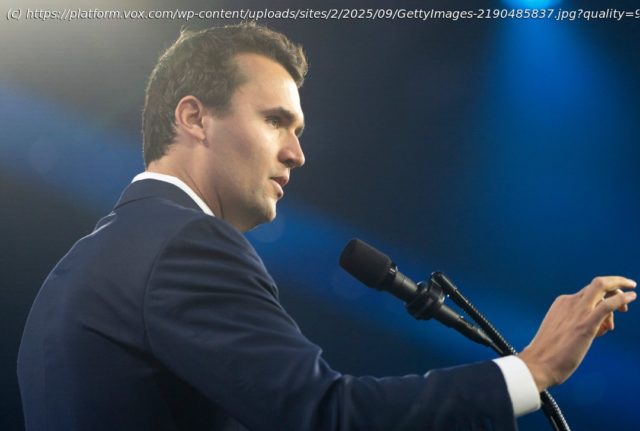What studying hundreds of political assassinations has revealed.
After the fatal shooting of conservative influencer Charlie Kirk last week, observers rushed to take part in what’s become one of America’s most gruesome past times: waiting to figure out the politics of the shooter, so blame could be assigned to one party or the other for the tragedy.
Conservative politicians hurried to identify the shooter as a far-left Democrat. After Tyler Robinson was arrested for the shooting, left-wing commenters circulated unfounded theories that Robinson might be a Groyper, a white supremacist who thought Kirk’s racism didn’t go far enough. The war over Robinson’s identity reached a crescendo with Jimmy Kimmel’s suspension, after the late-night host seemed to imply Robinson was a MAGA supporter in a monologue Monday night. Meanwhile, the right, starting with President Donald Trump and Vice President JD Vance, has sought to spin Kirk’s killing into a larger narrative about the left’s propensity for political violence, a claim that isn’t backed by evidence.
Indeed, as Arie Perliger, a professor of criminology at UMass Lowell who has studied hundreds of political assassinations from the past century, has found, political violence is a much more complicated phenomenon than the current discourse would have us believe. “Each side picks the details that fit their own narratives, right?” he told Vox in a video interview.
And a closer look at assassinations reveals that the reasons for them run the gamut. For every assassin guided by a clearly comprehensive ideology of hatred and bigotry, there’s one who thinks assassinating a US president will help him impress an actor (Ronald Reagan and Jodie Foster, respectively). Thomas Matthew Crook, who shot at Donald Trump during a campaign event last summer, was a registered Republican who also donated to Joe Biden’s campaign.
Perliger thinks that when we endlessly obsess over the individual politics of an assassin, we’re focusing on the wrong question. “I think that we can learn much more about the overall conditions that facilitate people like Tyler Robinson,” he said. Those conditions, per Perliger’s research, include political polarization and endemic dysfunction — two qualities the US government has in spades right now.
You can read highlights from my conversation with Perliger below. They’ve been lightly edited for length and clarity.
Give me a quick overview of some of the research you’ve done on assassins.
Ten years ago, when I was faculty at West Point, we compiled a data set of around 700 political assassinations — not just of elected officials, but also judges and some other political figures. We tried to really understand if we could identify some patterns, some similarities, and if you could produce some kind of insights about the factors that can facilitate political assassinations.
Political assassination is perceived as a very quick shock to the system.
What we were able to find out is that political assassinations are a combination of two factors. First of all, there’s increasing political polarization and the overlap of different societal cleavages. The second thing is that in many cases, it is being utilized when groups, constituencies, individuals, movements are losing trust in the political system. In other words, they deem the political system as ineffective.
Ordinarily, when we want to promote political changes, it demands a lot of resources, time, money, mobilizing the masses, and so on. Political assassination is perceived as a very quick shock to the system that can really dramatically change the political landscape and as a result can help the assassin to promote their objectives, their agenda.
One of the things that is really striking is how frequently, for a lot of these very famous assassinations, the agenda at hand is hard to understand from the outside. How common is it for assassins to act for political reasons that the rest of us have a lot of trouble parsing?
Our expectation to see someone in his 20s having some kind of a coherent ideological framework — it’s a bit unrealistic, even if they do extreme acts of violence or any kind of extreme act.
It’s very difficult to understand how attitudes, emotions, and perceptions intersect to lead a young person to perpetrate [a crime].
Домой
United States
USA — mix A political violence scholar explains what the furor over Charlie Kirk’s killing...






